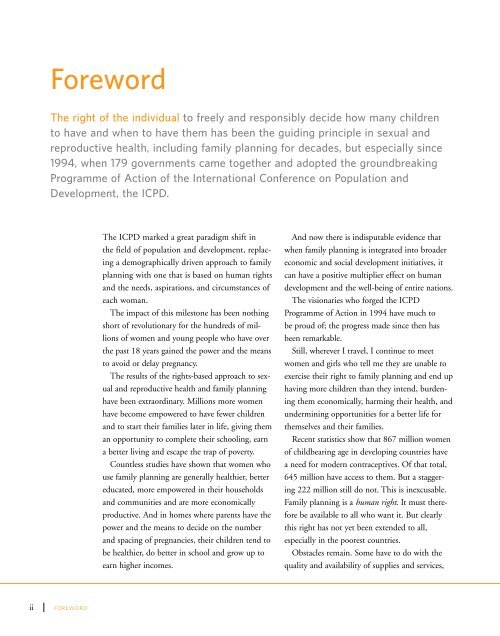State of World Population 2012 - Country Page List - UNFPA
State of World Population 2012 - Country Page List - UNFPA
State of World Population 2012 - Country Page List - UNFPA
Create successful ePaper yourself
Turn your PDF publications into a flip-book with our unique Google optimized e-Paper software.
Foreword<br />
The right <strong>of</strong> the individual to freely and responsibly decide how many children<br />
to have and when to have them has been the guiding principle in sexual and<br />
reproductive health, including family planning for decades, but especially since<br />
1994, when 179 governments came together and adopted the groundbreaking<br />
Programme <strong>of</strong> Action <strong>of</strong> the International Conference on <strong>Population</strong> and<br />
Development, the ICPD.<br />
The ICPD marked a great paradigm shift in<br />
the field <strong>of</strong> population and development, replacing<br />
a demographically driven approach to family<br />
planning with one that is based on human rights<br />
and the needs, aspirations, and circumstances <strong>of</strong><br />
each woman.<br />
The impact <strong>of</strong> this milestone has been nothing<br />
short <strong>of</strong> revolutionary for the hundreds <strong>of</strong> millions<br />
<strong>of</strong> women and young people who have over<br />
the past 18 years gained the power and the means<br />
to avoid or delay pregnancy.<br />
The results <strong>of</strong> the rights-based approach to sexual<br />
and reproductive health and family planning<br />
have been extraordinary. Millions more women<br />
have become empowered to have fewer children<br />
and to start their families later in life, giving them<br />
an opportunity to complete their schooling, earn<br />
a better living and escape the trap <strong>of</strong> poverty.<br />
Countless studies have shown that women who<br />
use family planning are generally healthier, better<br />
educated, more empowered in their households<br />
and communities and are more economically<br />
productive. And in homes where parents have the<br />
power and the means to decide on the number<br />
and spacing <strong>of</strong> pregnancies, their children tend to<br />
be healthier, do better in school and grow up to<br />
earn higher incomes.<br />
And now there is indisputable evidence that<br />
when family planning is integrated into broader<br />
economic and social development initiatives, it<br />
can have a positive multiplier effect on human<br />
development and the well-being <strong>of</strong> entire nations.<br />
The visionaries who forged the ICPD<br />
Programme <strong>of</strong> Action in 1994 have much to<br />
be proud <strong>of</strong>; the progress made since then has<br />
been remarkable.<br />
Still, wherever I travel, I continue to meet<br />
women and girls who tell me they are unable to<br />
exercise their right to family planning and end up<br />
having more children than they intend, burdening<br />
them economically, harming their health, and<br />
undermining opportunities for a better life for<br />
themselves and their families.<br />
Recent statistics show that 867 million women<br />
<strong>of</strong> childbearing age in developing countries have<br />
a need for modern contraceptives. Of that total,<br />
645 million have access to them. But a staggering<br />
222 million still do not. This is inexcusable.<br />
Family planning is a human right. It must therefore<br />
be available to all who want it. But clearly<br />
this right has not yet been extended to all,<br />
especially in the poorest countries.<br />
Obstacles remain. Some have to do with the<br />
quality and availability <strong>of</strong> supplies and services,<br />
ii<br />
FOREWORD
















